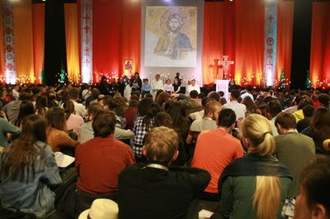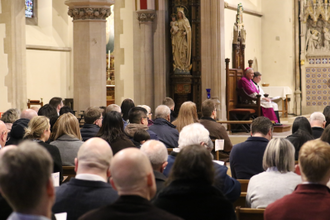Beirut: Young people from 43 countries attend Taize weekend

Youth participants gather with Taizé brothers for evening prayer. Photo: Katja Dorothea Buck/WCC
Around 1,600 young people from 43 countries came together in Beirut, Lebanon with the brothers of the ecumenical, monastic community of Taizé (France) from 23-25 March. Middle Eastern and Western Christians discovered how fruitful and stimulating an ecumenical exchange can be.
In many ways the gathering in Beirut was different from other international youth meetings. It was initiated and organised by the Christian youth in Lebanon, not by their churches. The youth convinced the heads of their respective churches to invite the brothers of Taizé and young people from all over the world to come and pray together in Beirut. The Middle East Council of Churches facilitated.
For 18 months, 120 young people met every week in mixed groups to plan the coming of 1,600 participants from Middle Eastern countries, Europe and Lebanon. They arranged transport, meals, locations for the workshops, decorations, printing of a booklet with all texts and chants, advertising for the meeting and a CD with the Taizé songs in Arabic. Last but not least, they looked for families to host the non-Lebanese guests for five days.
"For many of them it was the first time to work ecumenically," Rev Rima Nasrallah from the steering committee said. "They have learnt that people from other churches pray and read the Bible differently. And they have experienced that ecumenical cooperation needs a lot of effort, energy and patience. But they have also experienced that all efforts are worth it when, in the end, everyone owns the event."
Those who came from abroad had a colourful ecumenical experience. "It was a great opportunity to discover and live the Lebanese traditions and life," Mena Shawky from the Coptic Orthodox Church in Egypt said. Shawky was sent by ECHOS, the World Council of Churches Youth Commission. "It was my first time to pray with the Taizé brothers and I loved it very much, because we were all praying with the same language and same heart." He got the feedback from many Middle Eastern participants that they wish to participate in other upcoming ecumenical gatherings.
For many young people from Middle Eastern countries it was the first time to talk and pray with people from other church traditions and other different religious backgrounds. Among the 1,600 participants, one group came from Egypt, one from Jordan, from Iran and from Iraq where a civil war has given the population a hard time for many years. Thirty young people came from Palestine and everyone was happy that they could make it. Till the last day it was not clear whether they would get their visa. Another 30 young people came from Aleppo in Syria. Their local church has been heavily affected by the eight years of war. Many members died in the bombings or emigrated to Western countries. "It's good that people from other countries are here to listen to us", Sarah, a young Syrian woman, said.
For most of the 400 young people coming from Western countries it was the first time to meet with Middle Eastern Christians. In the morning workshops they experienced how fruitful an ecumenical exchange can be. By talking about the main theme "The righteous shall grow like a cedar in Lebanon" (Psalm 92), they reflected about their roots, what nourishes their faith and how they can reach out to the other like the horizontally growing branches of the cedar.
"When you don't have faith, it's easy to be afraid," Amir, a young Coptic Christian from Egypt stated. He comes from a church which was affected several times in the last years by terrorist attacks. "By reading this verse I have never thought that the cedar could be a symbol of faith", a Swedish girl said. For her it has always been just a tree. "Middle Eastern Christians have a much closer link to what is written in the Bible. They live in the same context than those who speak in the Bible", she said. And a Protestant student from Germany was quite happy to find himself in a non-Western context. "It's good to hear about the experience of young people in countries like Syria, Iraq or Palestine," he said. Like many other European participants, he was excited about singing the Taizé chants in Arabic.
The last day of the gathering was reserved for the Christian-Muslim dialogue. For several years, the 25th March has been a public holiday in Lebanon. Christians and Muslims celebrate both the Annunciation of Mary, for Mary is also an important person in the Koran. During a joint ceremony Mohamed Saleh, a young Muslim told about his experience with Taizé. He was one of the first Muslims who stayed for some weeks in the ecumenical community in France. He told the audience that this experience has been a life-changing point in his life. "The soul which is full of love cannot be tiring or tired," he said.
The spirit of Taizé with its deep spirituality and its wide horizon which goes beyond confessional borders apparently falls on fertile soil in Lebanon. "I love the idea to bring people together", Johny, a young Greek-Orthodox Lebanese said. "We are an open-minded generation. And I love the idea of Taizé to first trust in people and be open to them."
The Taizé community has had a strong link to Lebanon since 1982 when some brothers first visited the country during the civil war. "We admire the deep faith of the Christians in Lebanon. And we admire that they are at the same time able to enter into dialogue with the Muslim community", Brother Alois, the prior of the community said. "We are convinced that Lebanon is the door of understanding between the East and the West. And this understanding between East and West is very much needed, not only for the church but also for humanity", he said.
LINKS
Youth in the Ecumenical Movement - www.oikoumene.org/en/what-we-do/youth
ECHOS, WCC Youth Commission - www.oikoumene.org/en/what-we-do/youth/echos-youth-commission
*Katja Dorothea Buck is a German religious and political scientist and writes on Middle Eastern Christianity and ecumenical topics.


















